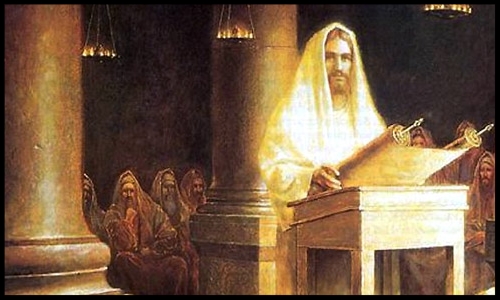 After the opening verse in the First Chapter in Luke’s Gospel, our reading picks up in chapter four where we find Jesus in the synagogue on a Sabbath. It seems obvious this was his custom; no one seemed surprised to see him there. He stands to read from the scroll handed to him: “The Spirit of the Lord is upon me – I have been anointed to bring glad tidings to the poor, to proclaim liberty to captives, sight to the blind, freedom to the oppressed and to proclaim a year acceptable to the Lord.” Then, “Rolling up the scroll, he handed it back to the attendant and sat down.”
After the opening verse in the First Chapter in Luke’s Gospel, our reading picks up in chapter four where we find Jesus in the synagogue on a Sabbath. It seems obvious this was his custom; no one seemed surprised to see him there. He stands to read from the scroll handed to him: “The Spirit of the Lord is upon me – I have been anointed to bring glad tidings to the poor, to proclaim liberty to captives, sight to the blind, freedom to the oppressed and to proclaim a year acceptable to the Lord.” Then, “Rolling up the scroll, he handed it back to the attendant and sat down.”
That would not have surprised anyone as it was the custom that one stand to read the scriptures and sit to teach. Jesus sat, gazed at the people and in all humility made an astounding statement, “Today this Scripture passage is fulfilled in your hearing.” He speaks of a “year acceptable to the Lord” making reference to the Jewish tradition of times when the land was left fallow and food stores were to be shared equally with all. A time of renewal in which debts were forgiven and slaves were freed.
Luke wants to assure his readers that what he writes is accurate and based on the experiences of people who did know Jesus personally. His purpose is to tell us the meaning of Jesus’ life, death and resurrection for our personal lives and why we should accept and follow Jesus as our King and Lord.
What did this message mean to the people in the synagogue? It meant that day what it means today: that Jesus is the promised Messiah, the anointed one sent by God to redeem His people. He came then, and He continues to come each and every day, to set us free. Why do we continue to try to solve our problems by ourselves instead of turning to God? All of us can awaken to God’s anointing power. It constantly inspires, enlivens and guides us. It soothes, comforts, welcomes and transforms us.
Messiah, the anointed one sent by God to redeem His people. He came then, and He continues to come each and every day, to set us free. Why do we continue to try to solve our problems by ourselves instead of turning to God? All of us can awaken to God’s anointing power. It constantly inspires, enlivens and guides us. It soothes, comforts, welcomes and transforms us.
If only we would listen! Listen to that still small Voice of God within or in the words of a mentor, spiritual director or our comrade in community. Or we can refuse to listen, we can refuse to believe, and we can refuse to let it make a difference for us. But it is still true. The Word of God stands forever! Jesus’ one-sentence sermon that day in the synagogue was his shortest in recorded history. It is also one of the most powerful.
And, we believe it because we believe in the one who spoke it. You’ll remember Luke tells us he was not an eyewitness to Jesus. But he has investigated everything accurately and written it down in an orderly sequence so we recognize the certainty of the message.
When Jesus taught in the synagogue, people listened but they did not understand everything, if they understood anything. They may have been struck by a word, a sentence and committed it to memory. Sounds like our lectio experience. That’s when the Spirit goes into action and enlightens us, at first only a little and later, more powerfully and persuasively. That’s why it is important to spend open-ended time with the Word, with God. We may have some favorite prayers we say that someone else wrote. But how would you feel if one you call “friend,” only shared with you something they’d memorized as a child or words from someone else’s pen?
We decide how to nourish our minds and feed our spirits by choosing what to read and to watch, what to reflect on. And, we decide how to protect our minds and spirits by not reading or watching what does not uplift us and make a positive impact on our lives and those we engage with in conversation. Like Scholastica and Benedict on that memorable night, we want to spend time in “holy conversation.”
Sometimes we forget how precious the Word of God is. A powerful example is in this true story. In 1964, the Romanian government released religious and political prisoners. Among them was one who had spent nearly three of his fourteen years in prison in solitary confinement. After his release, he wrote a book entitled In God’s Underground in which he describes how one day a new prisoner was brought in. The upper part of his body was in a plaster cast. When the guards withdrew, he slipped out a small tattered book secretly hidden between his skin and the plaster cast. None of the other prisoners had seen a book for years. They asked him what the book was. It was the Gospel of John. The author of the story writes that he took the book in his hand and no life-saving drug could have been more precious to him. From that day, the tattered little book went from hand to hand, many learned it by heart and each day they would discuss it among themselves. That reminds us that sometimes we forget the importance of the Word of God in our lives.
~Reflection by Sister Roberta Bailey, OSB, Prioress
Unusually cold days predicted for Florida this week …
maybe it will do in the virus that plagues us …
Stay safe – be healthy – know peace!
First Reading: Nehemiah 8:2-4a,5-6,8-10 Second Reading: 1 Corinthians 12:12-30
Gospel: Luke 1:1-4; 4:14-21


Leave a Reply